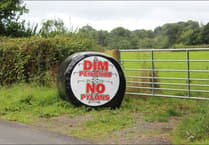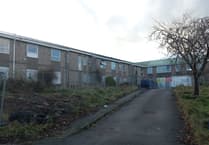Democracy means the power of the people. Winston Churchill called it the “worst form of government, apart from all the others”. Looking around the world, I think most of us would agree that he was right.
Editor’s note: This is the first Right Field column, running every third week, by Patrick Loxdale, Chairman of the Ceredigion Conservatives. He’s writing in a personal capacity, and his take offers a different perspective on current local current affairs. Fear not: the Cambrian News isn’t suddenly lurching to the right. No, we warmly welcome all views and opinions here in our Opinion & Feedback pages. Feel free to express your views and thoughts in a Letter to the Editor.
Our democratic system has developed over centuries. By definition it isn’t perfect and quite rightly it continues to evolve. If we started with a blank sheet of paper, we probably wouldn’t come up with our current system. But it works for better or worse, and that means it is very important that changes are well thought through.
In 1997 Scotland and Wales were offered, and voted for devolution, although in Wales only fractionally over 50 per cent of the electorate actually voted, and fractionally over half of them voted for devolution. In other words, our system of government changed quite significantly on 25 per cent of the electorate being in positive agreement.
In 2011, the then Welsh Assembly took on more power following a further referendum (36 per cent turnout, 63 per cent Yes) with only 23 per cent positively backing the proposal. This gave the Assembly law making powers over areas of devolved competence including Health and Education. We saw these in action during the pandemic, with different parts of the UK taking different approaches. In 2020, the Assembly became Senedd Cymru, The Welsh Parliament.
Now there are proposals for yet more change. With only sixty members, it is claimed that there is insufficient capacity to properly scrutinise the Welsh Government (whilst simultaneously representing constituents), and that his could lead to the passage of bad laws. It is worth noting that Senedd laws aren’t scrutinised in the way House of Commons law is, by an equivalent to the House of Lords.
A Special Purpose Committee was looking into this, when the leaders of Welsh Labour and Plaid Cymru decided on a solution. Combined, they have a super majority of Senedd Members. But looking back at the 2021 Senedd Election their combined vote share was 59 per cent of a 47 per cent turnout, or 28 per cent of Welsh Voters.
Their plan is to create a 96 seat Senedd, based on current Westminster Constituencies pairing up and electing 6 members each using the d’Hondt (Proportional Representation) voting system, closed party lists and gender quotas. There may be some good arguments for this but it is a big change. For example, Independent Candidates may simply be excluded, and it will be hard for smaller parties to win seats.
Welsh Labour and Plaid Cymru are pushing these changes through based on the implied support of just over a quarter of the electorate. How constituencies are paired up could make a big difference to the outcome of the next election. It is not unreasonable to ask just how “democratic” these changes are, or even if there is a bit of political self-interest at play.
Could this be a ploy to secure a “permanent” Welsh Labour Government in Cardiff? And will Plaid Cymru supporters come to regret that? Many people in West Wales feel forgotten by our metropolitan centred government, who seem neither to understand nor care about the rural economy and way of life.
Welsh democracy is important, so it is disappointing that the turnout at Senedd elections is so low. Maybe we fail to appreciate just how much of our lives are now governed by decisions made in Cardiff. The changes to our voting system will have a profound impact on our lives. They should have been debated more widely and scrutinised more carefully.
There is a sense that this has all been driven on the whim of a small handful of people. That’s not really democracy.
We should all demand better.



